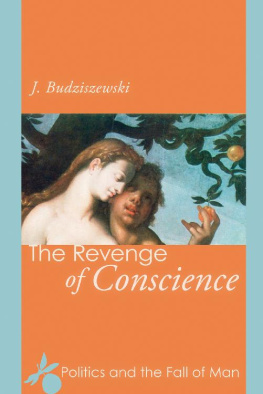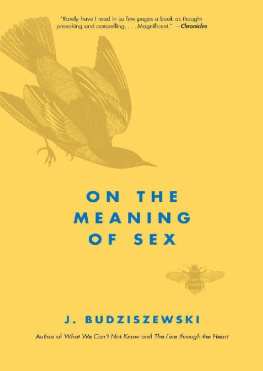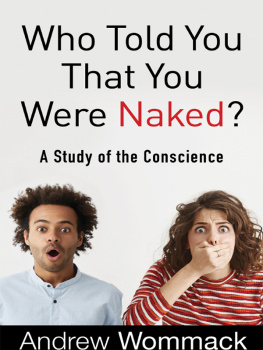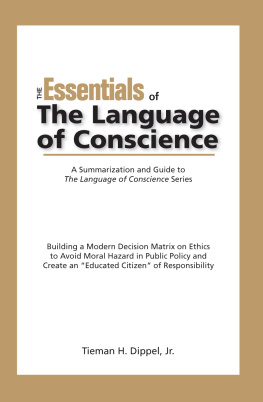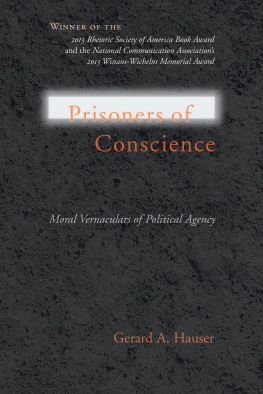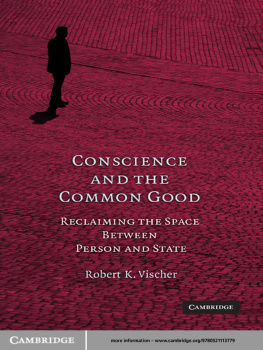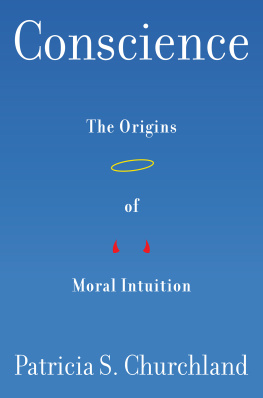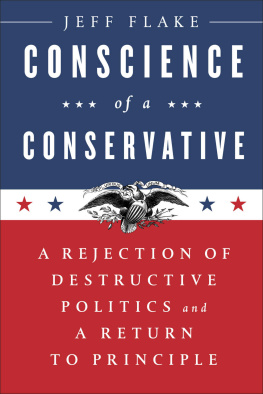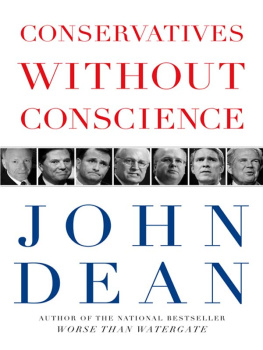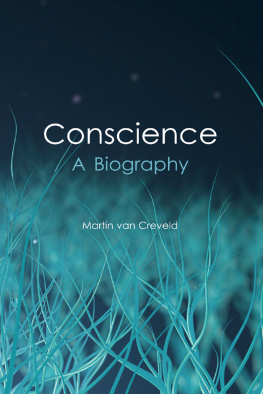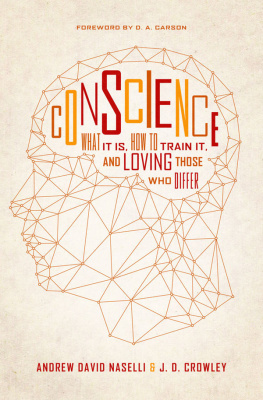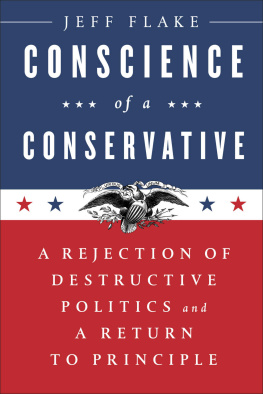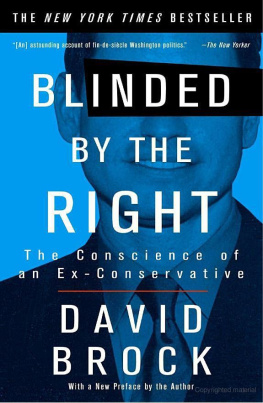The Revenge of Conscience:
Politics and the Fall of Man
J. Budziszewski
Table of Contents
To Sandra, beyond rubies, best gift
In gratitude to the maker
Blessed be He
Preface
Seventeen years ago I stood before the Government Department of the University of Texas to give a talk. I was fresh out of graduate school, and it was my here's-why-you-should-hire-me lecture. I wanted to teach about ethics and politics, so as academic job seekers do everywhere, I was showing the faculty my stuff.
So what did I tell them? Two things. The first was that we human beings merely make up the difference between good and evil; the second was that we aren't responsible for what we do anyway. And I laid out a ten-year plan for rebuilding ethical and political theory on these two propositions.
Does that seem a good plan for getting a job teaching the young? Or does it seem a better plan for getting committed to the state mental hospital? Well, I wasn't committed to the state mental hospital, but I did get a job teaching the young.
My purpose is to tell how I became a nihilist, and how I escaped from nihilism. Perhaps I should first explain just what my argument for nihilism was.
My two former claims have already been mentioned: that we make up the difference between good and evil, and that we aren't responsible for what we do anyway. My argument reversed this order, because first I denied personal responsibility. The reasoning was not very original. We could not have free will, I thought, because everything we do or think or feel is just an effect of prior causes. It makes no difference that some of those prior causes are my previous deeds or thoughts or feelings, because those would be effects of still earlier causes, and if we traced the chain further and further back, sooner or later we would come to causes that are outside of me completely, such as my heredity and environment.
Second I concluded that if we have no free will, then good and evil cannot make sense. On the one hand I am not responsible for my deeds, so I cannot be praised or blamed for good or evil; on the other hand I am not responsible for my thoughts, so I cannot have any confidence that my reasoning will lead me to the truth about good and evil. So far it may seem that my argument was merely skeptical, not nihilist. But I reasoned that if the good for man cannot be known to man, then it cannot be offered to man as his good; for all practical purposes, then, there is no good.
This practical nihilism was linked with a practical atheism, for my arguments were couched in such a way that I thought they applied to God too. He couldn't escape causality either, I thought; therefore He couldn't possess confident knowledge of good and evil any more than I could. And even if He could achieve such a standard, it would make no sense for Him enforce it, because, entrapped in causality like Him, human beings have no ultimate control over their conduct. The upshot was that although God might exist, He would be irrelevant. I could not quite rule out the existence of God, but I thought I could rule out the existence of a God that mattered.
The holes in the preceding arguments are so large that one can see light through them. One hole is that in order to deny free will I assumed that I understood causality. That is foolish because I didn't know what causality really is any more than I understand what free will really is. They are equally wonderful and mysterious, so I had no business pretending to understand one in order to attack the other. Another problem is that my argument was self-referentially incoherent. If my lack of free will made my reasoning unreliable so I couldn't find out which ideas about good and evil are true, then by the same token I shouldn't have been able to find out which ideas about free will are true either. But in that case I had no business denying that I had free will in the first place.
At this point two things must be clearly understood. The first: One might think that my arguments for nihilism were what led me to become a nihilist, but that is not true. I was committed to nihilism already, and cooked up the arguments only to rationalize it. The second: One might think that my recognition of the holes in the arguments were what enabled me to escape nihilism, but that is not true either. I saw the holes in my arguments even at the time, and covered them over with elaborate nonsense like the need to take an ironic view of reality. Good and evil just had to be meaningless and personal responsibility just had to be nonexistent. The arguments were secondary. I was determined.
A friend -- may he forgive me for quoting him -- thinks my dismissal of my previous rationalizations as elaborate nonsense seems too pat. "Is it really that simple?" he asks. The answer is that yes, it really is that simple. In my present opinion (though not my opinion of seventeen years ago), modern ethics is going about matters backwards. It assumes that the problem of human sin has to do mostly with the state of our knowledge; in other words, that we really don't know what's right and wrong and that we are trying to find out. Actually it has to do mostly with the state of our will. In other words, by and large we do know the basics of right and wrong but wish we didn't, and we are trying, for one reason or another, to keep ourselves in ignorance.
Is this an ad hominem argument -- that because my motive was bad, my nihilism must have been false? No, it is a diagnosis, with myself as case in point. My nihilism was false because it was self-referentially incoherent. * The motive was bad because although I knew this to be the case, rather than give up the nihilism I embraced the incoherency. What one must do with such a fellow is not to tell him what he doesn't know (because he really knows it), but to blow away the smokescreens by which he hides from the knowledge he has already.
Then how did I become a nihilist? Why was I so determined? What were my real motives?
There were quite a few. One was that having been caught up in radical politics of the late 'sixties and early 'seventies, I had my own ideas about redeeming the world, ideas that were opposed to the Christian faith of my childhood. As I got further and further from God, I also got further and further from common sense about a great many other things, including moral law and personal responsibility.
That first reason for nihilism led to a second. By now I had committed certain sins that I didn't want to repent. Because the presence of God made me more and more uncomfortable, I began looking for reasons to believe that He didn't exist. It's a funny thing about us human beings: not many of us doubt God's existence and then start sinning. Most of us sin and then start doubting His existence.
A third reason for being a nihilist was simply that nihilism was taught to me. I may have been raised by Christian parents, but I'd heard all through school that even the most basic ideas about good and evil are different in every society. That is empirically false -- as C.S. Lewis remarked, cultures may disagree about whether a man may have one wife or four, but all of them know about marriage; they may disagree about which actions are most courageous, but none of them rank cowardice as a virtue. But by the time I was taught the false anthropology of the times, I wanted very much to believe it.
A fourth reason, related to the last, was the very way I was taught to use language. My high school English teachers were determined to teach me the difference between what they called facts and what they called opinions, and I noticed that moral propositions were always included among the opinions. My college social science teachers were equally determined to teach me the difference between what they called facts and what they called values, and to much the same effect: the atomic weight of sodium was a fact, but the wrong of murder was not. I thought that to speak in this fashion was to be logical. Of course it had nothing to do with logic; it was merely nihilism itself, in disguise.

